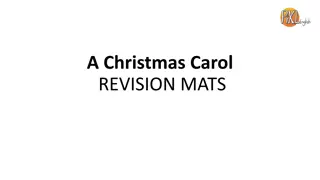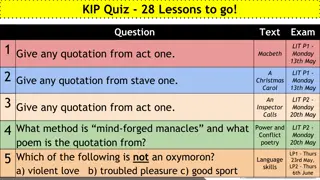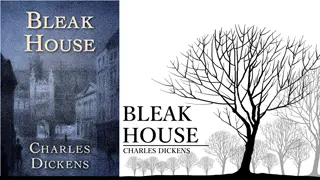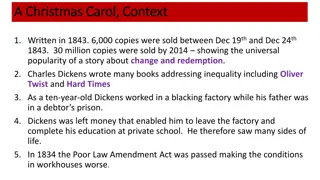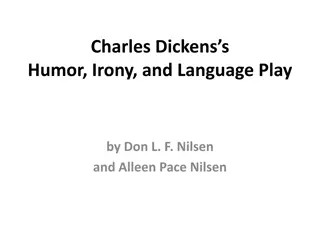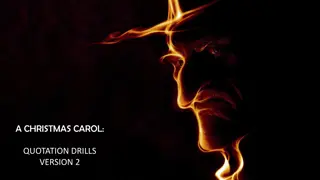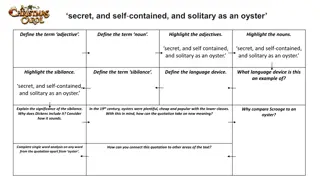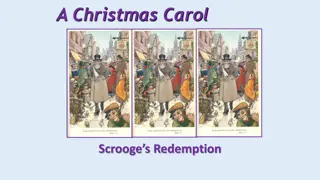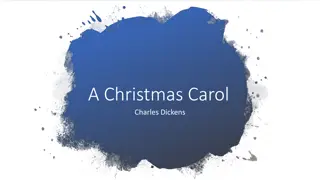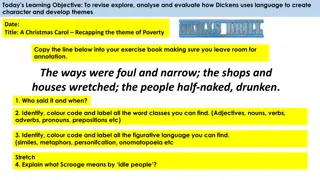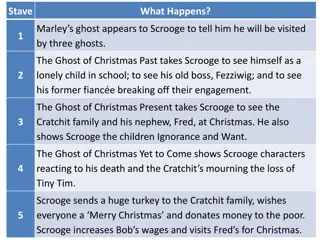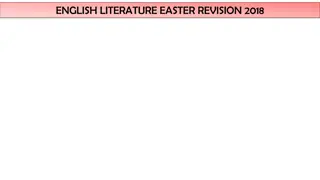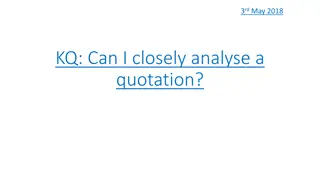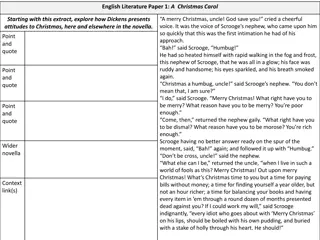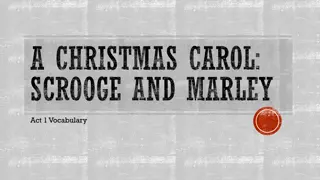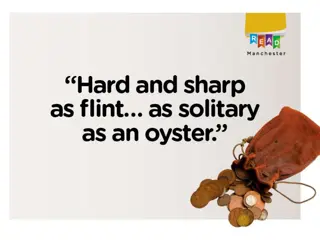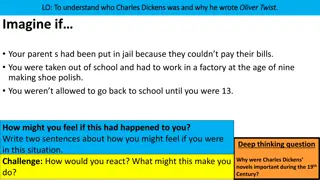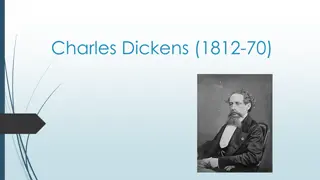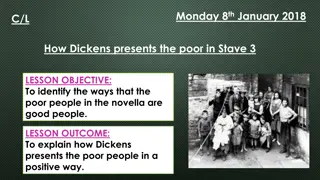Analyzing the Opening of 'A Christmas Carol' by Charles Dickens
In the opening paragraphs of "A Christmas Carol" by Charles Dickens, we are introduced to the character of Scrooge and the news of Marley's death. Dickens creates a somber and mysterious atmosphere, emphasizing Marley's death to set the stage for the supernatural events to come. We learn about Scrooge's cold and miserly nature, setting the tone for the story's themes of redemption and transformation. The mention of Hamlet's father alludes to themes of ghostly visitations and familial ties. Dickens uses descriptive language to paint a vivid picture of Scrooge's character and the cold, unfriendly world he inhabits.
Download Presentation

Please find below an Image/Link to download the presentation.
The content on the website is provided AS IS for your information and personal use only. It may not be sold, licensed, or shared on other websites without obtaining consent from the author.If you encounter any issues during the download, it is possible that the publisher has removed the file from their server.
You are allowed to download the files provided on this website for personal or commercial use, subject to the condition that they are used lawfully. All files are the property of their respective owners.
The content on the website is provided AS IS for your information and personal use only. It may not be sold, licensed, or shared on other websites without obtaining consent from the author.
E N D
Presentation Transcript
1. Marley was dead: to begin with Marley was dead: to begin with. There is no doubt whatever about that. The register of his burial was signed by the clergyman, the clerk, the undertaker, and the chief mourner. Scrooge signed it. And Scrooge's name was good upon 'Change, for anything he chose to put his hand to. Old Marley was as dead as a door-nail. Mind! I don't mean to say that I know, of my own knowledge, what there is particularly dead about a door-nail. I might have been inclined, myself, to regard a coffin-nail as the deadest piece of ironmongery in the trade. But the wisdom of our ancestors is in the simile; and my unhallowed hands shall not disturb it, or the Country's done for. You will therefore permit me to repeat, emphatically, that Marley was as dead as a door-nail. Scrooge knew he was dead? Of course he did. How could it be otherwise? Scrooge and he were partners for I don't know how many years. Scrooge was his sole executor, his sole administrator, his sole assign, his sole residuary legatee, his sole friend, and sole mourner. And even Scrooge was not so dreadfully cut up by the sad event, but that he was an excellent man of business on the very day of the funeral, and solemnised it with an undoubted bargain. The mention of Marley's funeral brings me back to the point I started from. There is no doubt that Marley was dead. This must be distinctly understood, or nothing wonderful can come of the story I am going to relate. If we were not perfectly convinced that Hamlet's Father died before the play began, there would be nothing more remarkable in his taking a stroll at night, in an easterly wind, upon his own ramparts, than there would be in any other middle-aged gentleman rashly turning out after dark in a breezy spot -- say Saint Paul's Churchyard for instance -- literally to astonish his son's weak mind. Scrooge never painted out Old Marley's name. There it stood, years afterwards, above the ware-house door: Scrooge and Marley. The firm was known as Scrooge and Marley. Sometimes people new to the business called Scrooge Scrooge, and sometimes Marley, but he answered to both names. It was all the same to him. TASK #4 - How is Scrooge introduced to us here? What do we learn about him? TASK #1 Why does Dickens include a colon after Marley was dead ? What is the effect? TASK #5 Why is Hamlet s father alluded to in the fourth paragraph? Research and explain. TASK #2 Why does Dickens spend so much time emphasising that Marley is dead? TASK #6 What kind of world do you think A Christmas Carol is set in based solely on this opening? TASK #3 What tone/atmosphere does the opening create? How does Dickens do this?
2. Scrooge Oh! But he was a tight-fisted hand at the grindstone, Scrooge! a squeezing, wrenching, grasping, scraping, clutching, covetous old sinner! Hard and sharp as flint, from which no steel had ever struck out generous fire; secret, and self-contained, and solitary as an oyster. The cold within him froze his old features, nipped his pointed nose, shrivelled his cheek, stiffened his gait; made his eyes red, his thin lips blue; and spoke out shrewdly in his grating voice. A frosty rime was on his head, and on his eyebrows, and his wiry chin. He carried his own low temperature always about with him; he iced his office in the dog-days; and didn't thaw it one degree at Christmas. External heat and cold had little influence on Scrooge. No warmth could warm, no wintry weather chill him. No wind that blew was bitterer than he, no falling snow was more intent upon its purpose, no pelting rain less open to entreaty. Foul weather didn't know where to have him. The heaviest rain, and snow, and hail, and sleet, could boast of the advantage over him in only one respect. They often came down handsomely, and Scrooge never did. Nobody ever stopped him in the street to say, with gladsome looks, ``My dear Scrooge, how are you? When will you come to see me?' No beggars implored him to bestow a trifle, no children asked him what it was o'clock, no man or woman ever once in all his life inquired the way to such and such a place, of Scrooge. Even the blindmen's dogs appeared to know him; and when they saw him coming on, would tug their owners into doorways and up courts; and then would wag their tails as though they said, ``No eye at all is better than an evil eye, dark master! '' But what did Scrooge care! It was the very thing he liked. To edge his way along the crowded paths of life, warning all human sympathy to keep its distance, was what the knowing ones call nuts to Scrooge. Once upon a time -- of all the good days in the year, on Christmas Eve -- old Scrooge sat busy in his counting-house. It was cold, bleak, biting weather: foggy withal: and he could hear the people in the court outside, go wheezing up and down, beating their hands upon their breasts, and stamping their feet upon the pavement stones to warm them. The city clocks had only just gone three, but it was quite dark already: it had not been light all day: and candles were flaring in the windows of the neighbouring offices, like ruddy smears upon the palpable brown air. The fog came pouring in at every chink and keyhole, and was so dense without, that although the court was of the narrowest, the houses opposite were mere phantoms. To see the dingy cloud come drooping down, obscuring everything, one might have thought that Nature lived hard by, and was brewing on a large scale. The door of Scrooge's counting-house was open that he might keep his eye upon his clerk, who in a dismal little cell beyond, a sort of tank, was copying letters. Scrooge had a very small fire, but the clerk's fire was so very much smaller that it looked like one coal. But he couldn't replenish it, for Scrooge kept the coal-box in his own room; and so surely as the clerk came in with the shovel, the master predicted that it would be necessary for them to part. Wherefore the clerk put on his white comforter, and tried to warm himself at the candle; in which effort, not being a man of a strong imagination, he failed. TASK #4 - Do you think Dickens uses hyperbole to describe Scrooge? If so, why? If not, why is Scrooge such a bad character? TASK #1 Highlight all the adjectives used to describe Scrooge and explain their effect here. TASK #5 How is Scrooge s clerk, Cratchit, presented as vulnerable in this extract? TASK #2 Find the simile used to describe Scrooge and explain its effect. TASK #6 What is the significance of light and dark in this extract? TASK #3 How does Dickens use pathetic fallacy to set the tone and atmosphere?
3. Are there no prisons? ``At this festive season of the year, Mr Scrooge,'' said the gentleman, taking up a pen, ``it is more than usually desirable that we should make some slight provision for the Poor and destitute, who suffer greatly at the present time. Many thousands are in want of common necessaries; hundreds of thousands are in want of common comforts, sir.'' ``Are there no prisons?'' asked Scrooge. ``Plenty of prisons,'' said the gentleman, laying down the pen again. ``And the Union workhouses?'' demanded Scrooge. ``Are they still in operation?'' ``They are. Still,'' returned the gentleman, `` I wish I could say they were not.'' ``The Treadmill and the Poor Law are in full vigour, then?'' said Scrooge. ``Both very busy, sir.'' ``Oh! I was afraid, from what you said at first, that something had occurred to stop them in their useful course,'' said Scrooge. ``I'm very glad to hear it.'' ``Under the impression that they scarcely furnish Christian cheer of mind or body to the multitude,'' returned the gentleman, ``a few of us are endeavouring to raise a fund to buy the Poor some meat and drink, and means of warmth. We choose this time, because it is a time, of all others, when Want is keenly felt, and Abundance rejoices. What shall I put you down for?'' ``Nothing!'' Scrooge replied. ``You wish to be anonymous?'' ``I wish to be left alone,'' said Scrooge. ``Since you ask me what I wish, gentlemen, that is my answer. I don't make merry myself at Christmas and I can't afford to make idle people merry. I help to support the establishments I have mentioned: they cost enough: and those who are badly off must go there.'' ``Many can't go there; and many would rather die.'' ``If they would rather die,'' said Scrooge, ``they had better do it, and decrease the surplus population. Besides -- excuse me -- I don't know that.'' ``But you might know it,'' observed the gentleman. ``It's not my business,'' Scrooge returned. ``It's enough for a man to understand his own business, and not to interfere with other people's. Mine occupies me constantly. Good afternoon, gentlemen!'' TASK #4 - How does Scrooge isolate himself from the rest of society? TASK #1 What kind of character is Scrooge in this extract? TASK #5 What does Scrooge mean by the surplus population ? Explain. TASK #2 How does this scene prove that A Christmas Carol is a political diatribe? TASK #6 Considering what happens at the end of the story, why is Dickens making Scrooge SO unlikeable here? TASK #3 What was the Poor Law ? Why is Scrooge asking about it?
4. Foggier yet, and colder! Meanwhile the fog and darkness thickened so, that people ran about with flaring links, proffering their services to go before horses in carriages, and conduct them on their way. The ancient tower of a church, whose gruff old bell was always peeping slyly down at Scrooge out of a gothic window in the wall, became invisible, and struck the hours and quarters in the clouds, with tremulous vibrations afterwards as if its teeth were chattering in its frozen head up there. The cold became intense. In the main street, at the corner of the court, some labourers were repairing the gas- pipes, and had lighted a great fire in a brazier, round which a party of ragged men and boys were gathered: warming their hands and winking their eyes before the blaze in rapture. The water-plug being left in solitude, its overflowings sullenly congealed, and turned to misanthropic ice. The brightness of the shops where holly sprigs and berries crackled in the lamp-heat of the windows, made pale faces ruddy as they passed. Poulterers' and grocers' trades became a splendid joke: a glorious pageant, with which it was next to impossible to believe that such dull principles as bargain and sale had anything to do. The Lord Mayor, in the stronghold of the might Mansion House, gave orders to his fifty cooks and butlers to keep Christmas as a Lord Mayor's household should; and even the little tailor, whom he had fined five shillings on the previous Monday for being drunk and bloodthirsty in the streets, stirred up tomorrow's pudding in his garret, while his lean wife and the baby sallied out to buy the beef. Foggier yet, and colder! Piercing, searching, biting cold. If the good Saint Dunstan had but nipped the Evil Spirit's nose with a touch of such weather as that, instead of using his familiar weapons, then indeed he would have roared to lusty purpose. The owner of one scant young nose, gnawed and mumbled by the hungry cold as bones are gnawed by dogs, stooped down at Scrooge's keyhole to regale him with a Christmas carol: but at the first sound of God bless you, merry gentleman! May nothing you dismay! Scrooge seized the ruler with such energy of action that the singer fled in terror, leaving the keyhole to the fog and even more congenial frost. At length the hour of shutting up the counting-house arrived. With an ill-will Scrooge dismounted from his stool, and tacitly admitted the fact to the expectant clerk in the Tank, who instantly snuffed his candle out, and put on his hat. ``You'll want all day tomorrow, I suppose?'' said Scrooge. ``If quite convenient, Sir.'' ``It's not convenient,'' said Scrooge, ``and it's not fair. If I was to stop half-a-crown for it, you'd think yourself ill-used, I'll be bound?'' The clerk smiled faintly. ``And yet,'' said Scrooge, ``you don't think me ill-used, when I pay a day's wages for no work.'' The clerk observed that it was only once a year. TASK #1 How does Dickens use pathetic fallacy to set the mood? TASK #4 - Who is Saint Dunstan ? What is Dickens saying here? TASK #5 Scrooge is willing to result to physical violence to block out any cheer. What does this tell us about him? TASK #2 Piercing, searching, biting cold What language devices have been used here and what effect do they have? TASK #6 The clerk smiled faintly How is the relationship between Scrooge and his clerk presented at the beginning of the story? TASK #3 Could the fog have a symbolic meaning? If so, what is it?
5. The Knocker Now, it is a fact, that there was nothing at all particular about the knocker on the door, except that it was very large. It is also a fact, that Scrooge had seen it, night and morning, during his whole residence in that place; also that Scrooge had as little of what is called fancy about him as any man in the City of London, even including -- which is a bold word -- the corporation, aldermen, and livery. Let it also be borne in mind that Scrooge had not bestowed one thought on Marley, since his last mention of his seven-year's dead partner that afternoon. And then let any man explain to me, if he can, how it happened that Scrooge, having his key in the lock of the door, saw in the knocker, without its undergoing any intermediate process of change: not a knocker, but Marley's face. Marley's face. It was not in impenetrable shadow as the other objects in the yard were, but had a dismal light about it, like a bad lobster in a dark cellar. It was not angry or ferocious, but looked at Scrooge as Marley used to look: with ghostly spectacles turned up upon its ghostly forehead. The hair was curiously stirred, as if by breath or hot-air; and, though the eyes were wide open, they were perfectly motionless. That, and its livid colour, made it horrible; but its horror seemed to be in spite of the face and beyond its control, rather than a part of its own expression. As Scrooge looked fixedly at this phenomenon, it was a knocker again. To say that he was not startled, or that his blood was not conscious of a terrible sensation to which it had been a stranger from infancy, would be untrue. But he put his hand upon the key he had relinquished, turned it sturdily, walked in, and lighted his candle. He did pause, with a moment's irresolution, before he shut the door; and he did look cautiously behind it first, as if he half expected to be terrified with the sight of Marley's pigtail sticking out into the hall. But there was nothing on the back of the door, except the screws and nuts that held the knocker on, so he said ``Pooh, pooh!'' and closed it with a bang. The sound resounded through the house like thunder. Every room above, and every cask in the wine-merchant's cellars below, appeared to have a separate peal of echoes of its own. Scrooge was not a man to be frightened by echoes. He fastened the door, and walked across the hall, and up the stairs, slowly too: trimming his candle as he went. You may talk vaguely about driving a coach-and-six up a good old flight of stairs, or through a bad young Act of Parliament; but I mean to say you might have got a hearse up that staircase, and taken it broadwise, with the splinter-bar towards the wall and the door towards the balustrades: and done it easy. There was plenty of width for that, and room to spare; which is perhaps the reason why Scrooge thought he saw a locomotive hearse going on before him in the gloom. Half-a- dozen gas-lamps out of the street wouldn't have lighted the entry too well, so you may suppose that it was pretty dark with Scrooge's dip. Up Scrooge went, not caring a button for that: darkness is cheap, and Scrooge liked it. But before he shut his heavy door, he walked through his rooms to see that all was right. He had just enough recollection of the face to desire to do that. TASK #1 Why does Dickens go to great lengths to emphasise the plain appearance of the knocker at the beginning? TASK #4 - What is a locomotive hearse ? How does this image help to create tension? TASK #5 Why do you think Scrooge lives like he does, seeing as he can afford to live an affluent life? TASK #2 Darkness is cheap, and Scrooge liked it Explain the relationship that Dickens creates between Scrooge and darkness. TASK #6 he walked through his rooms to see that all was right What is Dickens hinting at here? Why? TASK #3 Identify and language devices used and explain their effect.
6. Marleys Ghost Again the spectre raised a cry, and shook its chain, and wrung its shadowy hands. ``You are fettered,'' said Scrooge, trembling. ``Tell me why?'' ``I wear the chain I forged in life,'' replied the Ghost. ``I made it link by link, and yard by yard; I girded it on of my own free will, and of my own free will I wore it. Is its pattern strange to you?'' Scrooge trembled more and more. ``Or would you know,'' pursued the Ghost, ``the weight and length of the strong coil you bear yourself? It was full as heavy and as long as this, seven Christmas Eves ago. You have laboured on it, since. It is a ponderous chain!'' Scrooge glanced about him on the floor, in the expectation of finding himself surrounded by some fifty or sixty fathoms of iron cable: but he could see nothing. ``Jacob,'' he said, imploringly. ``Old Jacob Marley, tell me more. Speak comfort to me, Jacob.'' ``I have none to give,'' the Ghost replied. ``It comes from other regions, Ebenezer Scrooge, and is conveyed by other ministers, to other kinds of men. Nor can I tell you what I would. A very little more, is all permitted to me. I cannot rest, I cannot stay, I cannot linger anywhere. My spirit never walked beyond our counting-house -- mark me! -- in life my spirit never roved beyond the narrow limits of our money-changing hole; and weary journeys lie before me!'' It was a habit with Scrooge, whenever he became thoughtful, to put his hands in his breeches pockets. Pondering on what the Ghost had said, he did so now, but without lifting up his eyes, or getting off his knees. ``You must have been very slow about it, Jacob,'' Scrooge observed, in a business-like manner, though with humility and deference. ``Slow!'' the Ghost repeated. ``Seven years dead,'' mused Scrooge. ``And travelling all the time?'' ``The whole time,'' said the Ghost. ``No rest, no peace. Incessant torture of remorse.'' TASK #1 Explain the metaphor, I wear the chain I forged in life. TASK #4 - Highlight the adjectives used to describe the way Scrooge speaks and explain what they tell us about him at this point. TASK #5 Why do you think Scrooge is given a second chance? What message is Dickens trying to convey to his readers? TASK #2 Scrooge speaks to Jacob imploringly . What kind of word is this and what does it tell us about Scrooge? TASK #3 Highlight verbs used to tell us Scrooge s movements. How do we think he is feeling here?
7. The Ghost of Christmas Past The curtains of his bed were drawn aside, I tell you, by a hand. Not the curtains at his feet, nor the curtains at his back, but those to which his face was addressed. The curtains of his bed were drawn aside; and Scrooge, starting up into a half-recumbent attitude, found himself face to face with the unearthly visitor who drew them: as close to it as I am now to you, and I am standing in the spirit at your elbow. It was a strange figure -- like a child: yet not so like a child as like an old man, viewed through some supernatural medium, which gave him the appearance of having receded from the view, and being diminished to a child's proportions. Its hair, which hung about its neck and down its back, was white as if with age; and yet the face had not a wrinkle in it, and the tenderest bloom was on the skin. The arms were very long and muscular; the hands the same, as if its hold were of uncommon strength. Its legs and feet, most delicately formed, were, like those upper members, bare. It wore a tunic of the purest white and round its waist was bound a lustrous belt, the sheen of which was beautiful. It held a branch of fresh green holly in its hand; and, in singular contradiction of that wintry emblem, had its dress trimmed with summer flowers. But the strangest thing about it was, that from the crown of its head there sprung a bright clear jet of light, by which all this was visible; and which was doubtless the occasion of its using, in its duller moments, a great extinguisher for a cap, which it now held under its arm. Even this, though, when Scrooge looked at it with increasing steadiness, was not its strangest quality. For as its belt sparkled and glittered now in one part and now in another, and what was light one instant, at another time was dark, so the figure itself fluctuated in its distinctness: being now a thing with one arm, now with one leg, now with twenty legs, now a pair of legs without a head, now a head without a body: of which dissolving parts, no outline would be visible in the dense gloom wherein they melted away. And in the very wonder of this, it would be itself again; distinct and clear as ever. ``Are you the Spirit, sir, whose coming was foretold to me?'' asked Scrooge. ``I am!'' The voice was soft and gentle. Singularly low, as if instead of being so close beside him, it were at a distance. ``Who, and what are you?'' Scrooge demanded. ``I am the Ghost of Christmas Past.'' TASK #1 Look at the sentence highlighted in bold. Why does Dickens include this? What is the effect? TASK #4 - Why does Dickens juxtapose the wintry emblem with summer flowers ? TASK #5 Sparkled and glittered What word class do these words belong to and what do they suggest about the ghost? TASK #2 Highlight a simile used to describe the ghost and explain the effect. TASK #6 Note down anything else of interest about the ghost and explain your thoughts. TASK #3 What does the clear jet of light symbolise here?
8. Scrooges School Scrooge's former self grew larger at the words, and the room became a little darker and more dirty. The panels shrunk, the windows cracked; fragments of plaster fell out of the ceiling, and the naked laths were shown instead; but how all this was brought about, Scrooge knew no more than you do. He only knew that it was quite correct; that everything had happened so; that there he was, alone again, when all the other boys had gone home for the jolly holidays. He was not reading now, but walking up and down despairingly. Scrooge looked at the Ghost, and with a mournful shaking of his head, glanced anxiously towards the door. It opened; and a little girl, much younger than the boy, came darting in, and putting her arms about his neck, and often kissing him, addressed him as her ``Dear, dear brother.'' ``I have come to bring you home, dear brother!'' said the child, clapping her tiny hands, and bending down to laugh. ``To bring you home, home, home!'' ``Home, little Fan?'' returned the boy. ``Yes!'' said the child, brimful of glee. ``Home, for good and all. Home, for ever and ever. Father is so much kinder than he used to be, that home's like Heaven! He spoke so gently to me one dear night when I was going to bed, that I was not afraid to ask him once more if you might come home; and he said Yes, you should; and sent me in a coach to bring you. And you're to be a man!'' said the child, opening her eyes, ``and are never to come back here; but first, we're to be together all the Christmas long, and have the merriest time in all the world.'' ``You are quite a woman, little Fan!'' exclaimed the boy. She clapped her hands and laughed, and tried to touch his head; but being too little, laughed again, and stood on tiptoe to embrace him. Then she began to drag him, in her childish eagerness, towards the door; and he, nothing loth to go, accompanied her. TASK #1 Why do you think the ghost shows Scrooge his school days? TASK #4 - How does Dickens create sympathy for the young boy left at school? Focus on the language used. TASK #5 How are Scrooge and his sister different? What is Dickens saying about Scrooge at this point? Explain your ideas focusing on the language Dickens uses. TASK #2 How does Dickens allude to the fact that Scrooge s relationship with his father is strained? TASK #6 What would school have been like at this time? Research and note your findings down here. TASK #3 What are the connotations of boy ?
9. Mr and Mrs Fezziwig ``Hilli-ho!'' cried old Fezziwig, skipping down from the high desk, with wonderful agility. ``Clear away, my lads, and let's have lots of room here! Hilli-ho, Dick! Chirrup, Ebenezer!'' Clear away! There was nothing they wouldn't have cleared away, or couldn't have cleared away, with old Fezziwig looking on. It was done in a minute. Every movable was packed off, as if it were dismissed from public life for evermore; the floor was swept and watered, the lamps were trimmed, fuel was heaped upon the fire; and the warehouse was as snug, and warm, and dry, and bright a ball-room, as you would desire to see upon a winter's night. In came a fiddler with a music-book, and went up to the lofty desk, and made an orchestra of it, and tuned like fifty stomach-aches. In came Mrs. Fezziwig, one vast substantial smile. In came the three Miss Fezziwigs, beaming and lovable. In came the six young followers whose hearts they broke. In came all the young men and women employed in the business. In came the housemaid, with her cousin, the baker. In came the cook, with her brother's particular friend, the milkman. In came the boy from over the way, who was suspected of not having board enough from his master; trying to hide himself behind the girl from next door but one, who was proved to have had her ears pulled by her Mistress. In they all came, one after another; some shyly, some boldly, some gracefully, some awkwardly, some pushing, some pulling; in they all came, anyhow and everyhow. Away they all went, twenty couple at once; hands half round and back again the other way; down the middle and up again; round and round in various stages of affectionate grouping; old top couple always turning up in the wrong place; new top couple starting off again, as soon as they got there; all top couples at last, and not a bottom one to help them. When this result was brought about, old Fezziwig, clapping his hands to stop the dance, cried out, ``Well done!'' and the fiddler plunged his hot face into a pot of porter, especially provided for that purpose. But scorning rest, upon his reappearance, he instantly began again, though there were no dancers yet, as if the other fiddler had been carried home, exhausted, on a shutter, and he were a bran-new man resolved to beat him out of sight, or perish. There were more dances, and there were forfeits, and more dances, and there was cake, and there was negus, and there was a great piece of Cold Roast, and there was a great piece of Cold Boiled, and there were mince-pies, and plenty of beer. But the great effect of the evening came after the Roast and Boiled, when the fiddler (an artful dog, mind! The sort of man who knew his business better than you or I could have told it him!) struck up ``Sir Roger de Coverley.'' Then old Fezziwig stood out to dance with Mrs. Fezziwig. Top couple, too; with a good stiff piece of work cut out for them; three or four and twenty pair of partners; people who were not to be trifled with; people who would dance, and had no notion of walking. But if they had been twice as many: ah, four times: old Fezziwig would have been a match for them, and so would Mrs. Fezziwig. As to her, she was worthy to be his partner in every sense of the term. If that's not high praise, tell me higher, and I'll use it. A positive light appeared to issue from Fezziwig's calves. They shone in every part of the dance like moons. You couldn't have predicted, at any given time, what would become of 'em next. And when old Fezziwig and Mrs. Fezziwig had gone all through the dance; advance and retire, hold hands with your partner, bow and curtsey; corkscrew; thread-the-needle, and back again to your place; Fezziwig cut -- cut so deftly, that he appeared to wink with his legs, and came upon his feet again without a stagger. TASK #3 - How does Fezziwig differ from Scrooge in his attitude to business ethics? Why does Dickens include this contrast? Explain your ideas using quotations from the extract and wider novel. TASK #1 Highlight language devices and word classes used to describe the Fezziwigs. Explain their effect in this box. TASK #2 Earlier in the text, Fezziwig s voice is described as comfortable, oily, rich fat and jovial . Complete single word analysis on these adjectives. TASK #4 Even though he does not appear in this part of the novel, how does this extract increase the reader s sympathy for BOB CRATCHIT?
10. The Ghost of Christmas Present The moment Scrooge's hand was on the lock, a strange voice called him by his name, and bade him enter. He obeyed. It was his own room. There was no doubt about that. But it had undergone a surprising transformation. The walls and ceiling were so hung with living green, that it looked a perfect grove; from every part of which, bright gleaming berries glistened. The crisp leaves of holly, mistletoe, and ivy reflected back the light, as if so many little mirrors had been scattered there; and such a mighty blaze went roaring up the chimney, as that dull petrification of a hearth had never known in Scrooge's time, or Marley's, or for many and many a winter season gone. Heaped up on the floor, to form a kind of throne, were turkeys, geese, game, poultry, brawn, great joints of meat, sucking-pigs, long wreaths of sausages, mince-pies, plum-puddings, barrels of oysters, red- hot chesnuts, cherry-cheeked apples, juicy oranges, luscious pears, immense twelfth-cakes, and seething bowls of punch, that made the chamber dim with their delicious steam. In easy state upon this couch, there sat a jolly Giant, glorious to see: who bore a glowing torch, in shape not unlike Plenty's horn, and held it up, high up, to shed its light on Scrooge, as he came peeping round the door. ``Come in!'' exclaimed the Ghost. ``Come in. and know me better, man!'' Scrooge entered timidly, and hung his head before this Spirit. He was not the dogged Scrooge he had been; and though the Spirit's eyes were clear and kind, he did not like to meet them. ``I am the Ghost of Christmas Present,'' said the Spirit. ``Look upon me!'' Scrooge reverently did so. It was clothed in one simple green robe, or mantle, bordered with white fur. This garment hung so loosely on the figure, that its capacious breast was bare, as if disdaining to be warded or concealed by any artifice. Its feet, observable beneath the ample folds of the garment, were also bare; and on its head it wore no other covering than a holly wreath, set here and there with shining icicles. Its dark brown curls were long and free: free as its genial face, its sparkling eye, its open hand, its cheery voice, its unconstrained demeanour, and its joyful air. Girded round its middle was an antique scabbard; but no sword was in it, and the ancient sheath was eaten up with rust. ``You have never seen the like of me before!'' exclaimed the Spirit. ``Never,'' Scrooge made answer to it. ``Have never walked forth with the younger members of my family; meaning (for I am very young) my elder brothers born in these later years?'' pursued the Phantom. ``I don't think I have,'' said Scrooge. ``I am afraid I have not. Have you had many brothers, Spirit?'' ``More than eighteen hundred,'' said the Ghost. TASK #1 What atmosphere does Dickens intend to create in this stave and how does he do it? TASK #3 - What does the scabbard but no sword symbolise? TASK #4 How does the transformed setting of Scrooge s room contrast with earlier descriptions of it? TASK #2 Focus on the paragraph in bold. Highlight all the adjectives used and explain their effect. TASK #5 Scrooge reverently did so How is Scrooge beginning to change?
11. The Cratchits ``There are some upon this earth of yours,'' returned the Spirit, ``who lay claim to know us, and who do their deeds of passion, pride, ill-will, hatred, envy, bigotry, and selfishness in our name, who are as strange to us and all out kith and kin, as if they had never lived. Remember that, and charge their doings on themselves, not us.'' Scrooge promised that he would; and they went on, invisible, as they had been before, into the suburbs of the town. It was a remarkable quality of the Ghost (which Scrooge had observed at the baker's), that notwithstanding his gigantic size, he could accommodate himself to any place with ease; and that he stood beneath a low roof quite as gracefully and like a supernatural creature, as it was possible he could have done in any lofty hall. And perhaps it was the pleasure the good Spirit had in showing off this power of his, or else it was his own kind, generous, hearty nature, and his sympathy with all poor men, that led him straight to Scrooge's clerk's; for there he went, and took Scrooge with him, holding to his robe; and on the threshold of the door the Spirit smiled, and stopped to bless Bob Cratchit's dwelling with the sprinkling of his torch. Think of that! Bob had but fifteen bob a-week himself; he pocketed on Saturdays but fifteen copies of his Christian name; and yet the Ghost of Christmas Present blessed his four-roomed house! Then up rose Mrs Cratchit, Cratchit's wife, dressed out but poorly in a twice-turned gown, but brave in ribbons, which are cheap and make a goodly show for sixpence; and she laid the cloth, assisted by Belinda Cratchit, second of her daughters, also brave in ribbons; while Master Peter Cratchit plunged a fork into the saucepan of potatoes, and getting the corners of his monstrous shirt collar (Bob's private property, conferred upon his son and heir in honour of the day) into his mouth, rejoiced to find himself so gallantly attired, and yearned to show his linen in the fashionable Parks. And now two smaller Cratchits, boy and girl, came tearing in, screaming that outside the baker's they had smelt the goose, and known it for their own; and basking in luxurious thoughts of sage-and-onion, these young Cratchits danced about the table, and exalted Master Peter Cratchit to the skies, while he (not proud, although his collars nearly choked him) blew the fire, until the slow potatoes bubbling up, knocked loudly at the saucepan-lid to be let out and peeled. TASK #1 Based on this extract, what kind of family are the Cratchits? Use quotations to back up your ideas. TASK #4 - What is the significance of the potatoes bubbling up and knocking loudly ? What language device has been used and why? TASK #5 How does Dickens use the Cratchits to present the importance of family and Christmas to his readers? TASK #2 Why does the ghost show Scrooge the Cratchits? What can he learn from them? TASK #3 How do Belinda and Peter represent a generation of lost youth?
12. The Cratchits continued Such a bustle ensued that you might have thought a goose the rarest of all birds; a feathered phenomenon, to which a black swan was a matter of course; and in truth it was something very like it in that house. Mrs Cratchit made the gravy (ready beforehand in a little saucepan) hissing hot; Master Peter mashed the potatoes with incredible vigour; Miss Belinda sweetened up the apple-sauce; Martha dusted the hot plates; Bob took Tiny Tim beside him in a tiny corner at the table; the two young Cratchits set chairs for everybody, not forgetting themselves, and mounting guard upon their posts, crammed spoons into their mouths, lest they should shriek for goose before their turn came to be helped. At last the dishes were set on, and grace was said. It was succeeded by a breathless pause, as Mrs Cratchit, looking slowly all along the carving-knife, prepared to plunge it in the breast; but when she did, and when the long expected gush of stuffing issued forth, one murmur of delight arose all round the board, and even Tiny Tim, excited by the two young Cratchits, beat on the table with the handle of his knife, and feebly cried Hurrah! There never was such a goose. Bob said he didn't believe there ever was such a goose cooked. Its tenderness and flavour, size and cheapness, were the themes of universal admiration. Eked out by apple-sauce and mashed potatoes, it was a sufficient dinner for the whole family; indeed, as Mrs Cratchit said with great delight (surveying one small atom of a bone upon the dish), they hadn't ate it all at last! Yet every one had had enough, and the youngest Cratchits in particular, were steeped in sage and onion to the eyebrows! But now, the plates being changed by Miss Belinda, Mrs Cratchit left the room alone -- too nervous to bear witnesses -- to take the pudding up, and bring it in. Suppose it should not be done enough! Suppose it should break in turning out! Suppose somebody should have got over the wall of the back-yard, and stolen it, while they were merry with the goose: a supposition at which the two young Cratchits became livid! All sorts of horrors were supposed. Hallo! A great deal of steam! The pudding was out of the copper. A smell like a washing-day! That was the cloth. A smell like an eating-house and a pastrycook's next door to each other, with a laundress's next door to that! That was the pudding. In half a minute Mrs Cratchit entered: flushed, but smiling proudly: with the pudding, like a speckled cannon-ball, so hard and firm, blazing in half of half-a-quartern of ignited brandy, and bedight with Christmas holly stuck into the top. Oh, a wonderful pudding! Bob Cratchit said, and calmly too, that he regarded it as the greatest success achieved by Mrs Cratchit since their marriage. Mrs Cratchit said that now the weight was off her mind, she would confess she had had her doubts about the quantity of flour. Everybody had something to say about it, but nobody said or thought it was at all a small pudding for a large family. It would have been flat heresy to do so. Any Cratchit would have blushed to hint at such a thing. At last the dinner was all done, the cloth was cleared, the hearth swept, and the fire made up. The compound in the jug being tasted, and considered perfect, apples and oranges were put upon the table, and a shovel-full of chestnuts on the fire. Then all the Cratchit family drew round the hearth, in what Bob Cratchit called a circle, meaning half a one; and at Bob Cratchit's elbow stood the family display of glass; two tumblers, and a custard-cup without a handle. TASK #1 Focus on the first paragraph. What do you notice about the movements of the Cratchits? TASK #4 - What does the family display of glass tell readers about the Cratchits? TASK #5 What is Dickens suggesting about the power of Christmas? TASK #2 Focus on the punctuation Dickens uses. What do you notice? What does the punctuation do to the tone of the extract? TASK #6 What does fire represent here? TASK #3 Why do you think Dickens places so much emphasis on the pudding?
13. Christmas in the mines And now, without a word of warning from the Ghost, they stood upon a bleak and desert moor, where monstrous masses of rude stone were cast about, as though it were the burial-place of giants; and water spread itself wheresoever it listed; or would have done so, but for the frost that held it prisoner; and nothing grew but moss and furze, and coarse, rank grass. Down in the west the setting sun had left a streak of fiery red, which glared upon the desolation for an instant, like a sullen eye, and frowning lower, lower, lower yet, was lost in the thick gloom of darkest night. ``What place is this?'' asked Scrooge. ``A place where Miners live, who labour in the bowels of the earth,'' returned the Spirit. ``But they know me. See!'' A light shone from the window of a hut, and swiftly they advanced towards it. Passing through the wall of mud and stone, they found a cheerful company assembled round a glowing fire. An old, old man and woman, with their children and their children's children, and another generation beyond that, all decked out gaily in their holiday attire. The old man, in a voice that seldom rose above the howling of the wind upon the barren waste, was singing them a Christmas song: it had been a very old song when he was a boy; and from time to time they all joined in the chorus. So surely as they raised their voices, the old man got quite blithe and loud; and so surely as they stopped, his vigour sank again. The Spirit did not tarry here, but bade Scrooge hold his robe, and passing on above the moor, sped whither? Not to sea? To sea. To Scrooge's horror, looking back, he saw the last of the land, a frightful range of rocks, behind them; and his ears were deafened by the thundering of water, as it rolled, and roared, and raged among the dreadful caverns it had worn, and fiercely tried to undermine the earth. Built upon a dismal reef of sunken rocks, some league or so from shore, on which the waters chafed and dashed, the wild year through, there stood a solitary lighthouse. Great heaps of sea- weed clung to its base, and storm-birds -- born of the wind one might suppose, as sea-weed of the water -- rose and fell about it, like the waves they skimmed. But even here, two men who watched the light had made a fire, that through the loophole in the thick stone wall shed out a ray of brightness on the awful sea. Joining their horny hands over the rough table at which they sat, they wished each other Merry Christmas in their can of grog; and one of them: the elder, too, with his face all damaged and scarred with hard weather, as the figure-head of an old ship might be: struck up a sturdy song that was like a Gale in itself. Again the Ghost sped on, above the black and heaving sea -- on, on -- until, being far away, as he told Scrooge, from any shore, they lighted on a ship. They stood beside the helmsman at the wheel, the look-out in the bow, the officers who had the watch; dark, ghostly figures in their several stations; but every man among them hummed a Christmas tune, or had a Christmas thought, or spoke below his breath to his companion of some bygone Christmas Day, with homeward hopes belonging to it. And every man on board, waking or sleeping, good or bad, had had a kinder word for another on that day than on any day in the year; and had shared to some extent in its festivities; and had remembered those he cared for at a distance, and had known that they delighted to remember him. TASK #1 What is happening in this extract? TASK #3 - Explain the significance of light and darkness in this extract. TASK #4 Focus on ONE of the groups the ghost shows Scrooge. Explain what Scrooge could learn from them using quotations from the text. TASK #2 Why does the ghost show Scrooge what he does? What is Dickens trying to tell his readers about the power of Christmas? Explain your ideas using quotations from the text.
14. Ignorance and Want `Forgive me if I am not justified in what I ask,'' said Scrooge, looking intently at the Spirit's robe, ``but I see something strange, and not belonging to yourself, protruding from your skirts. Is it a foot or a claw!'' ``It might be a claw, for the flesh there is upon it,'' was the Spirit's sorrowful reply. ``Look here.'' From the foldings of its robe, it brought two children; wretched, abject, frightful, hideous, miserable. They knelt down at its feet, and clung upon the outside of its garment. ``Oh, Man! look here. Look, look, down here!'' exclaimed the Ghost. They were a boy and girl. Yellow, meagre, ragged, scowling, wolfish; but prostrate, too, in their humility. Where graceful youth should have filled their features out, and touched them with its freshest tints, a stale and shrivelled hand, like that of age, had pinched, and twisted them, and pulled them into shreds. Where angels might have sat enthroned, devils lurked, and glared out menacing. No change, no degradation, no perversion of humanity, in any grade, through all the mysteries of wonderful creation, has monsters half so horrible and dread. Scrooge started back, appalled. Having them shown to him in this way, he tried to say they were fine children, but the words choked themselves, rather than be parties to a lie of such enormous magnitude. ``Spirit! are they yours?'' Scrooge could say no more. ``They are Man's,'' said the Spirit, looking down upon them. ``And they cling to me, appealing from their fathers. This boy is Ignorance. This girl is Want. Beware them both, and all of their degree, but most of all beware this boy, for on his brow I see that written which is Doom, unless the writing be erased. Deny it!'' cried the Spirit, stretching out its hand towards the city. ``Slander those who tell it ye! Admit it for your factious purposes, and make it worse! And bide the end!'' ``Have they no refuge or resource?'' cried Scrooge. ``Are there no prisons?'' said the Spirit, turning on him for the last time with his own words. ``Are there no workhouses?'' The bell struck twelve. TASK #1 Complete single word analysis on FIVE of the words highlighted in bold. TASK #3 - How does this scene contribute to Dickens political diatribe? TASK #4 What is the effect of the ghost repeating Scrooge s words back to him? TASK #2 Explain the metaphor of ignorance and want . In your answer, explain why the ghost personifies both of these evil qualities. TASK #5 The spirit uses a range of imperatives at the end which are underlined. What is he instructing Scrooge to do? What is the effect?
15. The Ghost Of Christmas Yet To Come The Phantom slowly, gravely, silently approached. When it came, Scrooge bent down upon his knee; for in the very air through which this Spirit moved it seemed to scatter gloom and mystery. It was shrouded in a deep black garment, which concealed its head, its face, its form, and left nothing of it visible save one outstretched hand. But for this it would have been difficult to detach its figure from the night, and separate it from the darkness by which it was surrounded. He felt that it was tall and stately when it came beside him, and that its mysterious presence filled him with a solemn dread. He knew no more, for the Spirit neither spoke nor moved. ``I am in the presence of the Ghost of Christmas Yet To Come?'' said Scrooge. The Spirit answered not, but pointed onward with its hand. ``You are about to show me shadows of the things that have not happened, but will happen in the time before us,'' Scrooge pursued. ``Is that so, Spirit?'' The upper portion of the garment was contracted for an instant in its folds, as if the Spirit had inclined its head. That was the only answer he received. Although well used to ghostly company by this time, Scrooge feared the silent shape so much that his legs trembled beneath him, and he found that he could hardly stand when he prepared to follow it. The Spirit paused a moment, as observing his condition, and giving him time to recover. But Scrooge was all the worse for this. It thrilled him with a vague uncertain horror, to know that behind the dusky shroud, there were ghostly eyes intently fixed upon him, while he, though he stretched his own to the utmost, could see nothing but a spectral hand and one great heap of black. ``Ghost of the Future!'' he exclaimed, ``I fear you more than any spectre I have seen. But as I know your purpose is to do me good, and as I hope to live to be another man from what I was, I am prepared to bear you company, and do it with a thankful heart. Will you not speak to me?'' It gave him no reply. The hand was pointed straight before them. TASK #1 Highlight adverbs used to describe the Phantom and explain their effect. TASK #4 - Highlight any other words/phrases/devices used to describe the Phantom and explain their effect. TASK #5 How does Scrooge begin to demonstrate change in this extract? How is he rediscovering his own humanity? TASK #2 Why is this ghost described as a phantom ? What are the connotations? TASK #6 Why do you think the Phantom resembles the Grim Reaper? TASK #3 Why does the Phantom remain silent? What must Scrooge now do for himself?
16. Mourning Tiny Tim `Let me see some tenderness connected with a death,'' said Scrooge; ``or that dark chamber, Spirit, which we left just now, will be for ever present to me.'' The Ghost conducted him through several streets familiar to his feet; and as they went along, Scrooge looked here and there to find himself, but nowhere was he to be seen. They entered poor Bob Cratchit's house; the dwelling he had visited before; and found the mother and the children seated round the fire. Quiet. Very quiet. The noisy little Cratchits were as still as statues in one corner, and sat looking up at Peter, who had a book before him. The mother and her daughters were engaged in sewing. But surely they were very quiet! ````And he took a child, and set him in the midst of them.'''' Where had Scrooge heard those words? He had not dreamed them. The boy must have read them out, as he and the Spirit crossed the threshold. Why did he not go on? The mother laid her work upon the table, and put her hand up to her face. ``The colour hurts my eyes,'' she said. The colour? Ah, poor Tiny Tim! ``They're better now again,'' said Cratchit's wife. ``It makes them weak by candle-light; and I wouldn't show weak eyes to your father when he comes home, for the world. It must be near his time.'' ``Past it rather,'' Peter answered, shutting up his book. ``But I think he has walked a little slower than he used, these few last evenings, mother.'' They were very quiet again. At last she said, and in a steady, cheerful voice, that only faltered once: ``I have known him walk with -- I have known him walk with Tiny Tim upon his shoulder, very fast indeed.'' ``And so have I,'' cried Peter. ``Often.'' ``And so have I!'' exclaimed another. So had all. ``But he was very light to carry,'' she resumed, intent upon her work, ``and his father loved him so, that it was no trouble: no trouble. And there is your father at the door!'' TASK #1 What is happening in this extract? TASK #4 - Focus on the verbs and adverbs used in this extract. How do they compare to the verbs and adverbs used in the scene when the Cratchits are first introduced. Pick out specific examples. TASK #5 What is the point in showing Scrooge a family in mourning? TASK #2 How does this scene in the Cratchits household differ from the one that came before it? TASK #6 What is Dickens saying about the importance of family? TASK #3 Quiet. Very quiet. How does Dickens use structure to emphasise the changed atmosphere in the house?
17. Im as light as a feather Yes! and the bedpost was his own. The bed was his own, the room was his own. Best and happiest of all, the time before him was his own, to make amends in! ``I will live in the Past, the Present, and the Future!'' Scrooge repeated, as he scrambled out of bed. ``The Spirits of all Three shall strive within me. Oh Jacob Marley! Heaven, and the Christmas Time be praised for this! I say it on my knees, old Jacob; on my knees!'' He was so fluttered and so glowing with his good intentions, that his broken voice would scarcely answer to his call. He had been sobbing violently in his conflict with the Spirit, and his face was wet with tears. ``They are not torn down,'' cried Scrooge, folding one of his bed-curtains in his arms, ``they are not torn down, rings and all. They are here: I am here: the shadows of the things that would have been, may be dispelled. They will be. I know they will!'' His hands were busy with his garments all this time: turning them inside out, putting them on upside down, tearing them, mislaying them, making them parties to every kind of extravagance. ``I don't know what to do!'' cried Scrooge, laughing and crying in the same breath; and making a perfect Laoco n of himself with his stockings. ``I am as light as a feather, I am as happy as an angel, I am as merry as a school-boy. I am as giddy as a drunken man. A merry Christmas to every-body! A happy New Year to all the world! Hallo here! Whoop! Hallo!'' He had frisked into the sitting-room, and was now standing there: perfectly winded. TASK #1 Highlight any verbs and adverbs you can find relating to Scrooge. How are they different from Stave 1? TASK #4 - I will live in the Past, the Present and the Future! Explain what Scrooge means by this. TASK #5 Consider the punctuation used in this extract. What does it do to the tone and atmosphere? TASK #2 Highlight the similes Scrooge uses and explain their effect. TASK #6 What is Dickens saying about redemption here? (Consider the man Scrooge was and who he is now. What message is Dickens conveying to his readers?) TASK #3 How is Scrooge similar to the Cratchits when we are first introduced to them? What is Dickens trying to say?
18. The End Of It ``Hallo!'' growled Scrooge, in his accustomed voice, as near as he could feign it. ``What do you mean by coming here at this time of day.'' ``I am very sorry, sir,'' said Bob. ``I am behind my time.'' ``You are?'' repeated Scrooge. ``Yes. I think you are. Step this way, if you please.'' ``It's only once a year, sir,'' pleaded Bob, appearing from the Tank. ``It shall not be repeated. I was making rather merry yesterday, sir.'' ``Now, I'll tell you what, my friend,'' said Scrooge, ``I am not going to stand this sort of thing any longer. And therefore,'' he continued, leaping from his stool, and giving Bob such a dig in the waistcoat that he staggered back into the Tank again: ``and therefore I am about to raise your salary!'' Bob trembled, and got a little nearer to the ruler. He had a momentary idea of knocking Scrooge down with it; holding him, and calling to the people in the court for help and a strait-waistcoat. ``A merry Christmas, Bob!'' said Scrooge, with an earnestness that could not be mistaken, as he clapped him on the back. ``A merrier Christmas, Bob, my good fellow, than I have given you for many a year! I'll raise your salary, and endeavour to assist your struggling family, and we will discuss your affairs this very afternoon, over a Christmas bowl of smoking bishop, Bob! Make up the fires, and buy another coal-scuttle before you dot another i, Bob Cratchit.'' Scrooge was better than his word. He did it all, and infinitely more; and to Tiny Tim, who did not die, he was a second father. He became as good a friend, as good a master, and as good a man, as the good old city knew, or any other good old city, town, or borough, in the good old world. Some people laughed to see the alteration in him, but he let them laugh, and little heeded them; for he was wise enough to know that nothing ever happened on this globe, for good, at which some people did not have their fill of laughter in the outset; and knowing that such as these would be blind anyway, he thought it quite as well that they should wrinkle up their eyes in grins, as have the malady in less attractive forms. His own heart laughed: and that was quite enough for him. He had no further intercourse with Spirits, but lived upon the Total Abstinence Principle, ever afterwards; and it was always said of him, that he knew how to keep Christmas well, if any man alive possessed the knowledge. May that be truly said of us, and all of us! And so, as Tiny Tim observed, God Bless Us, Every One! TASK #1 in his accustomed voice, as near as he could feign it What is Dickens suggesting about Scrooge s transformation? TASK #4 - Highlight any words/phases/devices used to describe Scrooge and explain their effect. How do they differ from the beginning of the story? TASK #5 The lessons Dickens tried to teach contemporary readers about equality and responsibility are just as important now as they were then. Discuss. TASK #2 Make up the fires What is Dickens implying about the power of light here? TASK #3 He did it all, and infinitely more What are the connotations of infinity ?


